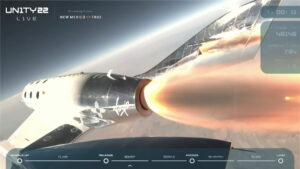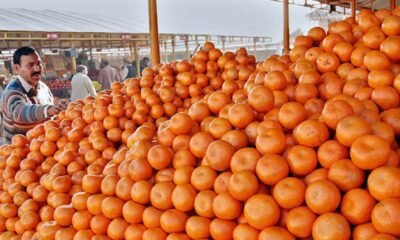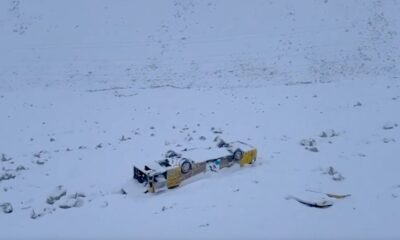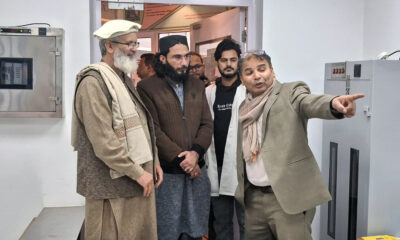Science & Technology
Billionaire Branson soars to space aboard Virgin Galactic flight
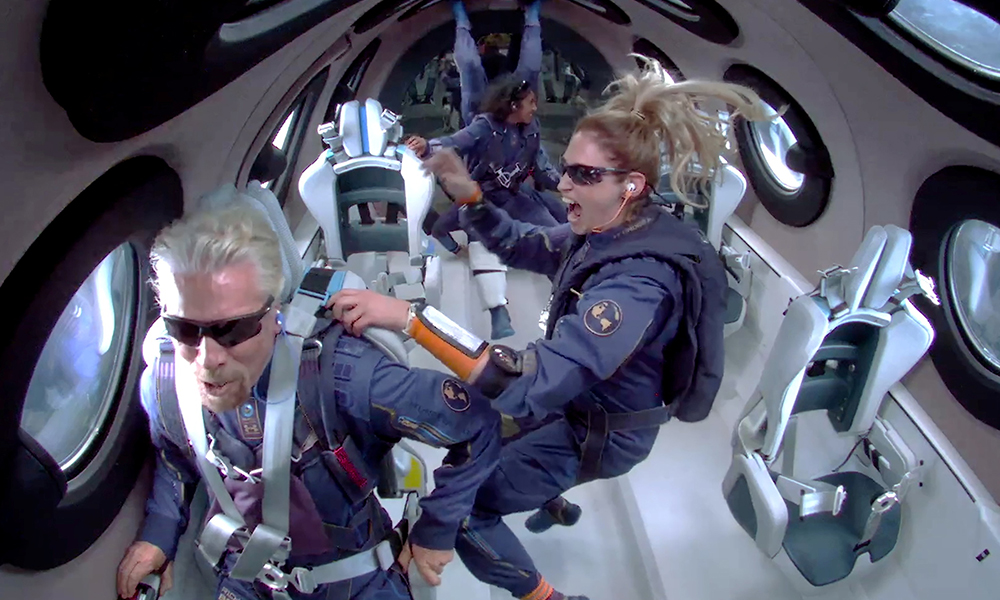
British billionaire Richard Branson on Sunday soared more than 50 miles above the New Mexico desert aboard his Virgin Galactic rocket plane and safely returned in the vehicle’s first fully crewed test flight to space, a symbolic milestone for a venture he started 17 years ago.
Branson, one of six Virgin Galactic Holding Inc employees strapped in for the ride, touted the mission as a precursor to a new era of space tourism, with the company he founded in 2004 poised to begin commercial operations next year.
“We’re here to make space more accessible to all,” an exuberant Branson, 70, said shortly after embracing his grandchildren following the flight. “Welcome to the dawn of a new space age.”
The success of the flight also gave the flamboyant entrepreneur bragging rights in a highly publicized rivalry with fellow billionaire Jeff Bezos, the Amazon online retail mogul who had hoped to fly into space first aboard his own space company’s rocket.
“Congratulations on the flight,” Bezos said on Instagram. “Can’t wait to join the club!”
Space industry executives, future customers and other well-wishers were on hand for a festive gathering to witness the launch, which was live-streamed in a presentation hosted by late-night television comedian Stephen Colbert. Joining the reception was another billionaire space industry pioneer, Elon Musk, who is also the founder of electric carmaker Tesla Inc.
Grammy-nominated R&B singer Khalid performed his forthcoming single “New Normal” after the flight.
The gleaming white spaceplane was carried aloft attached to the underside of the dual-fuselage jet VMS Eve (named for Branson’s late mother) from Spaceport America, a state-owned facility near the aptly named town of Truth or Consequences. Virgin Galactic leases a large section of the facility.
Reaching its high-altitude launch point at about 46,000 feet (14,020 m), the VSS Unity passenger rocket plane was released from the mothership and fell away as the crew ignited its rocket, sending it streaking straight upward at supersonic speed to the blackness of space some 53 miles (86 km) high.
The spaceplane’s contrail was clearly visible from the ground as it soared through the upper atmosphere, to the cheers of the crowd below.
At the apex of the climb with the rocket shut down, the crew then experienced a few minutes of microgravity, before the spaceplane shifted into re-entry mode, and began a gliding descent to a runway back at the spaceport. The entire flight lasted about an hour.
“I was once a child with a dream looking up to the stars. Now I’m an adult in a spaceship looking down to our beautiful Earth,” Branson said in a video from space.
Back at a celebration with supporters from a stage outside Virgin Galactic’s Gateway to Space complex at the spaceport, he and crewmates doused one another with champagne.
Retired Canadian astronaut Chris Hadfield pinned Virgin-produced astronaut wings onto the blue flight suits worn by Branson and his team. Official wing pins from the Federal Aviation Administration will be presented later, a company spokesman said.
HIGH-COST TICKETS
Virgin Galactic has said it plans at least two further test flights of the spaceplane in the months ahead before beginning regular commercial operation in 2022. One of those flights will carry four Italian astronauts-in-training, according to company CEO Michael Colglazier.
He said 600 wealthy would-be citizen astronauts have also booked reservations, priced at about $250,000 per ticket for the exhilaration of supersonic flight, weightlessness and the spectacle of spaceflight.
Branson has said he aims ultimately to lower the price to about $40,000 per seat as the company ramps up service, achieving greater economies of scale. Colglazier said he envisions eventually building a large enough fleet to accommodate roughly 400 flights annually at the spaceport.
The Swiss-based investment bank UBS has estimated the potential value of the space tourism market reaching $3 billion annually by 2030.
Proving rocket travel safe for the public is key.
An earlier prototype of the Virgin Galactic rocket plane crashed during a test flight over California’s Mojave Desert in 2014, killing one pilot and seriously injuring another.
SPACE RACE
Branson’s participation in Sunday’s flight, announced just over a week ago, typified his persona as the daredevil executive whose various Virgin brands – from airlines to music companies – have long been associated with his ocean-crossing exploits in sailboats and hot-air balloons.
His ride-along also upstaged rival astro-tourism venture Blue Origin and its founder, Bezos, in what has been popularized as the “billionaire space race.” Bezos has been planning to fly aboard his own suborbital rocketship, the New Shepard, later this month.
Branson has insisted he and Bezos are friendly rivals and were not racing to beat one another into space.
“We wish Jeff the absolute best and that he will get up and enjoy his flight,” Branson said at a post-flight news conference.
Blue Origin, however, has disparaged Virgin Galactic as falling short of a true spaceflight experience, saying that unlike Unity, Bezos’s New Shepard tops the 62-mile-high-mark (100 km), called the Kármán line, set by an international aeronautics body as defining the boundary between Earth’s atmosphere and space.
“New Shepard was designed to fly above the Kármán line so none of our astronauts have an asterisk next to their name,” Blue Origin said in a series of Twitter posts on Friday.
However, U.S. space agency NASA and the U.S. Air Force both define an astronaut as anyone who has flown higher than 50 miles (80 km).
A third player in the space tourism sector, Musk’s SpaceX, plans to send its first all-civilian crew (without Musk) into orbit in September, after having already launched numerous cargo payloads and astronauts to the International Space Station for NASA.
A Virgin Galactic spokesperson told the Wall Street Journal that Musk had bought a ticket for his own space ride. The newspaper said that it was not clear how far up the waiting list Musk is for a seat.
Representatives for Musk could not be immediately reached. Virgin Galactic and Tesla did not immediately respond to requests for comment.
The spaceplane’s two pilots were Dave Mackay and Michael Masucci. The three other mission specialists were Beth Moses, the company’s chief astronaut instructor; Virgin Galactic’s lead operations engineer Colin Bennett; and Sirisha Bandla, a research operations and government affairs vice president.
All recounted afterward being mesmerized by the view through Unity’s windows. Mackay described the immense blackness of space against the brightness of Earth’s surface, “separated by the beautiful blue atmosphere, which is very complex and very thin.”
“Cameras don’t do it justice,” he told reporters. “You have to see it with your own eyes.”
Science & Technology
Australia social media ban set to take effect, sparking a global crackdown
For the social media businesses, the implementation marks a new era of structural stagnation as user numbers flatline and time spent on platforms shrinks, studies show.

Australia is set to become the first country to implement a minimum age for social media use on Wednesday, with platforms like Instagram, TikTok and YouTube forced to block more than a million accounts, marking the beginning of an expected global wave of regulation.
From midnight, 10 of the biggest platforms will be required to block Australians aged under 16 or be fined up to A$49.5 million ($33 million), Reuters reported.
The law received harsh criticism from major technology companies and free speech advocates, but was praised by parents and child advocates.
The rollout closes out a year of speculation about whether a country can block children from using technology that is built into modern life. And it begins a live experiment that will be studied globally by lawmakers who want to intervene directly because they are frustrated by what they say is a tech industry that has been too slow to implement effective harm-minimisation efforts.
Governments from Denmark to Malaysia – and even some states in the U.S., where platforms are rolling back trust and safety features – say they plan similar steps, four years after a leak of internal Meta (META.O) documents showed the company knew its products contributed to body image problems and suicidal thoughts among teenagers while publicly denying the link existed.
“While Australia is the first to adopt such restrictions, it is unlikely to be the last,” said Tama Leaver, a professor of internet studies at Curtin University.
“Governments around the world are watching how the power of Big Tech was successfully taken on. The social media ban in Australia … is very much the canary in the coal mine.”
A spokesperson for the British government, which in July began forcing websites hosting pornographic content to block under-18 users, said it was “closely monitoring Australia’s approach to age restrictions.”
“When it comes to children’s safety, nothing is off the table,” they added.
Few will scrutinise the impact as closely as the Australians. The eSafety Commissioner, an Australian regulator tasked with enforcing the ban, hired Stanford University and 11 academics to analyse data on thousands of young Australians covered by the ban for at least two years.
Though the ban covers 10 platforms initially, including Alphabet’s (GOOGL.O), YouTube, Meta’s Instagram and TikTok, the government has said the list will change as new products appear and young users switch to alternatives.
Of the initial 10, all but Elon Musk’s X have said they will comply using age inference – guessing a person’s age from their online activity – or age estimation, which is usually based on a selfie. They might also check with uploaded identification documents or linked bank account details.
Musk has said the ban “seems like a backdoor way to control access to the internet by all Australians” and most platforms have complained that it violates people’s right to free speech.
For the social media businesses, the implementation marks a new era of structural stagnation as user numbers flatline and time spent on platforms shrinks, studies show.
Platforms say they don’t make much money showing advertisements to under-16s, but they add that the ban interrupts a pipeline of future users. Just before the ban took effect, 86% of Australians aged 8 to 15 used social media, the government said.
“The days of social media being seen as a platform for unbridled self-expression, I think, are coming to an end,” said Terry Flew, the co-director of University of Sydney’s Centre for AI, Trust and Governance.
Platforms responded to negative headlines and regulatory threats with measures like a minimum age of 13 and extra privacy features for teenagers, but “if that had been the structure of social media in the boom period, I don’t think we’d be having this debate,” he added.
Science & Technology
Ethiopian volcano erupts for first time in nearly 12,000 years
Ash from the eruption drifted across the region, spreading over Yemen, Oman, India, and parts of Pakistan.
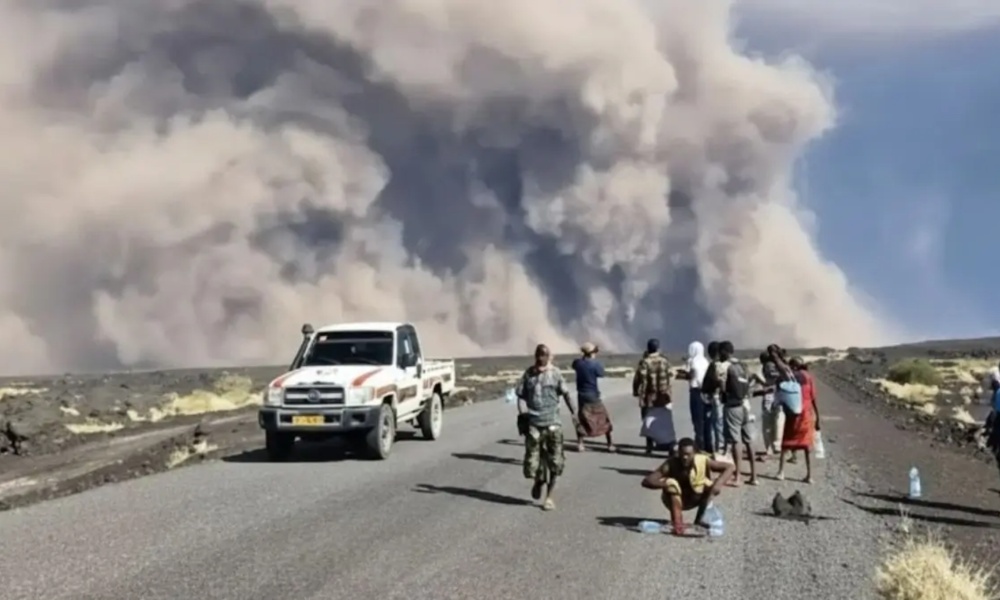
The Hayli Gubbi volcano in Ethiopia’s Afar region has erupted for the first time in almost 12,000 years, sending massive ash plumes soaring up to 14 kilometres into the atmosphere, according to the Toulouse Volcanic Ash Advisory Centre.
The eruption began on Sunday and lasted several hours. Hayli Gubbi, located around 800 kilometres northeast of Addis Ababa near the Eritrean border, sits within the geologically active Rift Valley, where two major tectonic plates meet. The volcano rises roughly 500 metres above the surrounding landscape.
Ash from the eruption drifted across the region, spreading over Yemen, Oman, India, and parts of Pakistan. Satellite imagery and social-media videos captured a towering column of white smoke billowing into the sky.
The Smithsonian Institution’s Global Volcanism Program notes that Hayli Gubbi has no recorded eruptions during the Holocene, the period dating back about 12,000 years to the end of the last Ice Age.
Volcanologist Simon Carn of Michigan Technological University also confirmed on Bluesky that the volcano had “no record of Holocene eruptions.”
Science & Technology
Cloudflare outage easing after millions of internet users affected
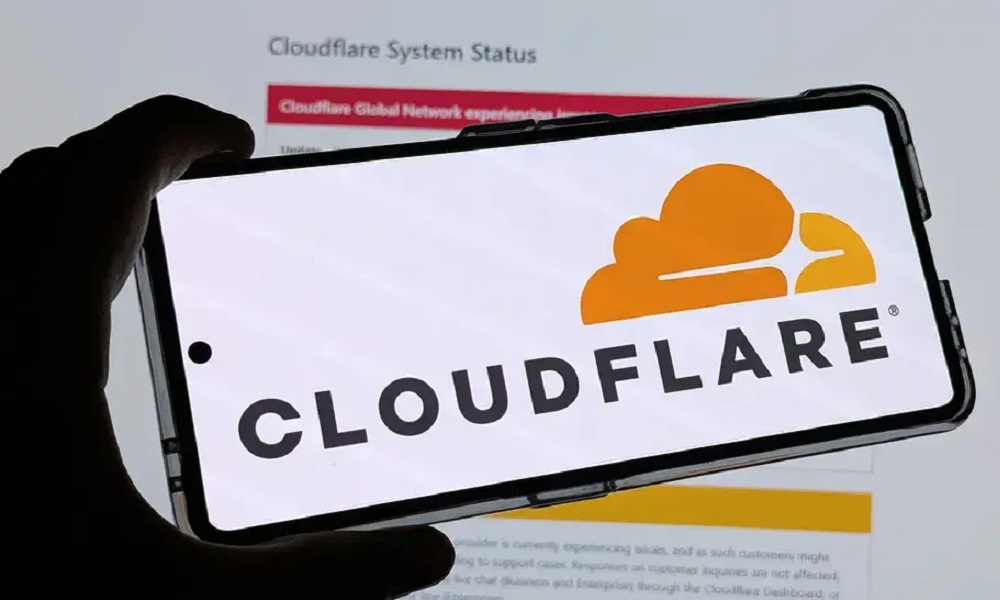
A global outage at web-infrastructure firm Cloudflare began to ease on Tuesday afternoon after preventing people from accessing major internet platforms, including X and ChatGPT.
Cloudflare, whose network handles around a fifth of web traffic, said it started to investigate the internal service degradation around 6:40 a.m. ET. It has deployed a fix but some customers might still be impacted as it recovers service.
The incident marked the latest hit to major online services. An outage of Amazon’s cloud service last month caused global turmoil as thousands of popular websites and apps, including Snapchat, were inaccessible due to the disruption.
Cloudflare – whose shares were down about 5% in premarket trading – runs one of the world’s largest networks that helps websites and apps load faster and stay online by protecting them from traffic surges and cyberattacks.
The latest outage prevented users from accessing platforms such as Canva, X, and ChatGPT, prompting users to log outage reports with Downdetector.
Downdetector tracks outages by collating status reports from a number of sources. “We saw a spike in unusual traffic to one of Cloudflare’s services beginning at 11:20 UTC. That caused some traffic passing through Cloudflare’s network to experience errors,” the company said in an emailed statement.
“We are all hands on deck to make sure all traffic is served without errors.”
X and ChatGPT-creator OpenAI did not immediately respond to requests for comment. – REUTERS
-
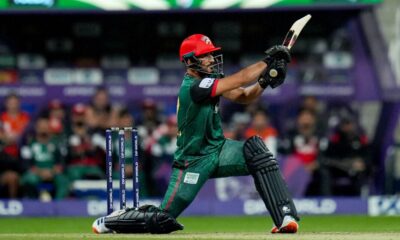
 International Sports5 days ago
International Sports5 days agoILT20: Abu Dhabi Knight Riders end Desert Vipers’ unbeaten run in dramatic one-run win
-

 Latest News3 days ago
Latest News3 days agoAfghan border forces prevent illegal entry of hundreds into Iran
-

 Latest News2 days ago
Latest News2 days agoPakistan summons Afghan diplomat over deadly attack in North Waziristan
-

 Business5 days ago
Business5 days agoMahirood Customs leads Iran’s exports to Afghanistan
-
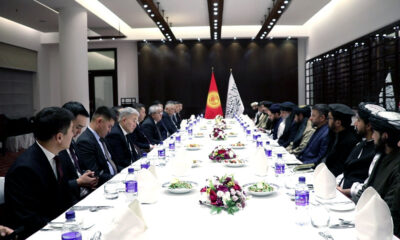
 Latest News5 days ago
Latest News5 days agoAfghanistan, Kyrgyzstan discuss expanding trade and economic cooperation
-

 Latest News3 days ago
Latest News3 days agoJapan allocates nearly $20 million in humanitarian aid for Afghanistan
-

 Latest News2 days ago
Latest News2 days agoKarzai urges reopening of girls’ schools and universities for Afghanistan’s bright future
-

 Health4 days ago
Health4 days agoAfghanistan seeks India’s support in standardizing traditional medicine

